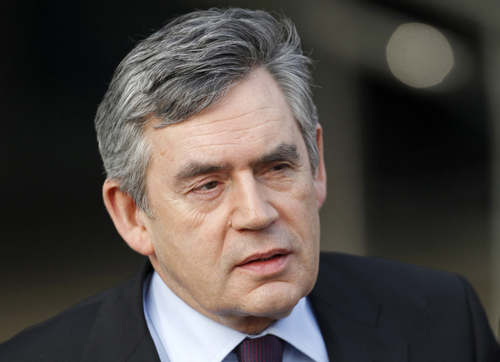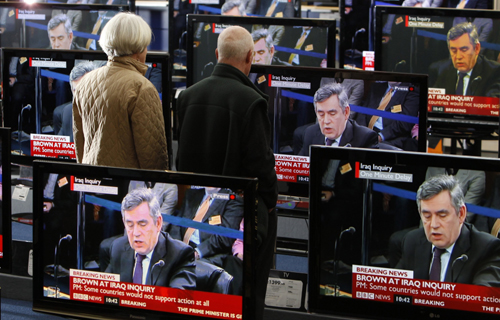British PM gives evidence to Iraq inquiry
British Prime Minister Gordon Brown on Friday told the Iraq inquiry he had supported the U.S.-led war because Iraq was in breach of UN resolutions.
|
|
|
Britain's Prime Minister Gordon Brown leaves after giving evidence to the Iraq Inquiry at the Queen Elizabeth II conference centre in London March 5, 2010. Brown told an official inquiry into the 2003 invasion of Iraq on Friday that going to war had been the right decision and that he had provided the necessary funding for military action. [Xinhua/Reuters Photo] |
He was giving evidence for the first time at the inquiry into Britain's role in the U.S.-led invasion of Iraq in 2003.
Brown insisted that throughout the build-up to war, the Cabinet had been kept fully informed of developments and "I didn't at any point (feel) that I lacked the information that was necessary."
But Brown said that, throughout the discussions, he stressed that military action should only be a last resort, saying that "I was very clear that we had to exhaust all the diplomatic avenues before we could conclude that it was inevitable or impossible to avoid a decision about war."
However, Brown also said the British government had made the "right decision, for the right reasons" to go to war.
As then-chancellor, Brown also denied claims he tried to restrict the funds available to the military in the run-up to the Iraq war.
He told the inquiry that former Defense Secretary Geoff Hoon's assertion that the Treasury was reluctant to provide cash for the conflict was incorrect.
"My role in this was, first of all as chancellor of the exchequer, to make sure that the funding was there for what we had to do," he said.
|
|
|
Britain's Prime Minister Gordon Brown is seen on television screens in an electrical store in Edinburgh, Scotland, as he gives evidence to the Iraq Inquiry being held in London March 5, 2010. [Xinhua/Reuters Photo] |
He said: "There should be no sense that there was any financial restraint in doing what was best for the military." He insisted that all requests for military equipment for the invasion were granted.
Brown said: "Every single request for equipment had to be met and every request was met. At any point, commanders were able to ask for equipment that they needed and I know of no occasion when they were turned down."
The inquiry committee had previously said it would not call the prime minister before the upcoming British general election because it did not want the poll to affect ministers' ability to give their evidence fully.
But there has been mounting political pressure for Brown to appear. William Hague, the opposition foreign affairs spokesman, said the inquiry and the British public needed to hear the full facts from everyone involved.
Liberal Democrat leader Nick Clegg said: "It is well known that the prime minister was a key figure in Britain's decision to invade Iraq. It is only right that Gordon Brown should explain his role in this disastrous foreign policy failure before asking the British people for their vote."
Tony Blair, prime minister at the time, gave evidence to the inquiry on Jan. 29.
The public hearing opened on Nov. 24, 2009, with the committee promising a "fair and frank" investigation, which would cover the entire eight-year period from the build-up to the war to the withdrawal of British troops.
The inquiry won't apportion blame or establish criminal or civil liability - only offer reprimands and recommendations in the hope mistakes won't be repeated in future.
 0
0 








